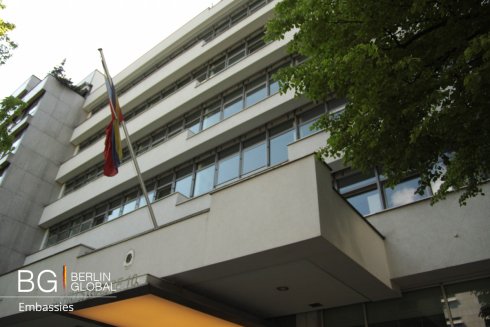The Cultural Politics of the Bolivarian Revolution: When Culture Empowers a Country
The event was hosted by the Embassy of Venezuela in Berlin
May 30th, 2016On May 26th the conference titled: The cultural politics of the Bolivian Revolution, took place in the Venezuela embassy. The event was part of the 'Semana Cultural de Venezuela' (Venezuelan's Cultural week) and mainly focused in the importance of culture for the Venezuelan community.
The speakers highlighted how traditions have helped to determine the identity of the people from Venezuela; how culture has promoted a change in the self-conception of Venezuela’s citizens; and how the political culture is crucial in order to maintain the peace inside a country and, also, between countries.
The conference started with a few words of the Ambassador of Venezuela, H.E. Amb. Ramon Orlando Maniglia Ferreira, who expressed his gratitude to those who made the Cultural Week of Venezuela possible, called for the diffusion of the event and introduced the two speakers, Ismael Cejas and Jesús Salcedo.
Ismael Cejas began his speech making reference to its positive effect for the revolution and looking back at the history of Venezuelan culture: At the end for the XX century Venezuela's traditions were losing prominence inside the Venezuelan society. The homogenization of cultures had made disappear most of the traditional costumes of the Venezuelan people and, at the same time, had dissolved the feeling of identity of the nation. By 1998 culture was seen as a product: cinema, exhibitions and other cultural activities were associated to an economic status. At this point, President Hugo Chavez wanted to motivate the Venezuelan community, who were politically apathetic. Chavez had two main objectives: recover the Venezuelan identity (the love for their flag, their land, their country) and recover the Venezuelan culture, which was not only about the country of Venezuela but also about the feeling of being part of America.
This last feeling was, and still is, what unites the traditions of every South American country to make them see their differences and, at the same time, recognize their similarities.
In 2005, the Ministerio del poder popular para la cultura (Ministry of the Popular Power for Culture) was created, which enables the creation of a structure that empowered the bottom of society’s pyramid and promoted the Venezuelan culture not as sporadic actions, but as everyday actions. From then, the old traditions were recovered and nowadays the Venezuelan society is more proud than ever of their country and their history. That new identity has not only made stronger their sense of belonging but has also promoted a better understanding between the South American countries. In words of Ismael Cejas: 'nuestro nacionalismo llama a la integración' ('our nationalism calls integration').
For his part, Jesús Salcedo talked about different historical and cultural heritages of Venezuela. He defended that culture means to cultivate mind and spirit, and that's what helps people to achieve a better life, to relate better and to get the peace they need. In Venezuela, there is a great range of traditions that have maintained for years, like the vasigenas, indigena's clay vessels that have been conserved for more than 3000 years. He also presented San Benito, known as 'the black saint', a tradition that happens at the end of December, when they take the statue of the saint out in the streets of Venezuela and venerate him. The diablos danzantes (dancing devils), the cruz de mayo (May cross), the gaita zuliana (a music style from the country), and the joropo, a (musical style that accompanies dance), are other examples of the great heritage of Venezuela's culture.
References and Links
News from Berlin
Marina Bartolomé, Berlin Global


